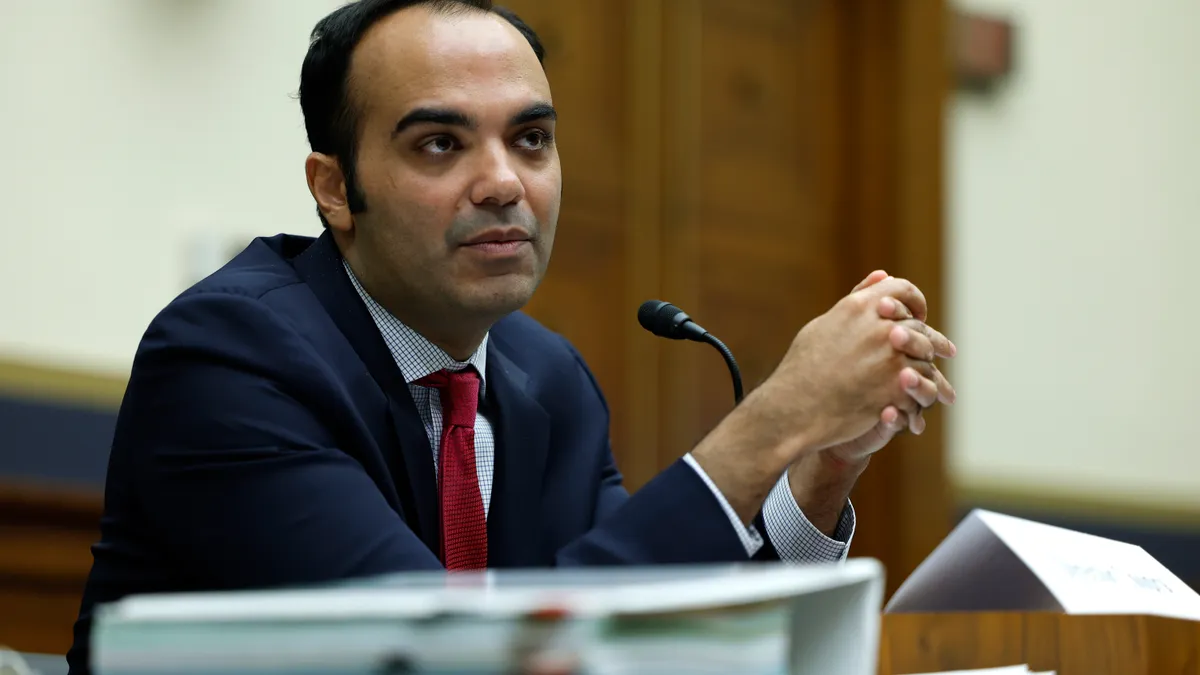The Consumer Financial Protection Bureau and the Department of Justice are working together more closely to address antitrust issues and criminal conduct, CFPB Director Rohit Chopra said at a Washington event Monday.
Chopra underscored the existence of a new agreement, signed last year, between the CFPB and DOJ during a panel discussion at the enforcement conference cohosted by the Federal Trade Commission and DOJ’s antitrust division for state and international regulators.
“Assistant A.G. Kanter and I, we have formed a new agreement,” Chopra said. The bureau will refer “potentially criminal conduct,” including “anti-competitive mischief,” to the DOJ for action, Chopra said.
When asked later about the agreement, a CFPB spokesperson pointed to a memorandum of understanding between the two agencies that took effect last November.
“When the CFPB detects potential antitrust violations while investigating conduct under the statutes it enforces, it will evaluate and, as appropriate, refer the matter to the [DOJ’s] Antitrust Division,” the memorandum said. “Following a referral from the CFPB, the Antitrust Division will determine whether to open a civil or criminal investigation into the conduct and, after investigation, whether to bring a lawsuit based on the conduct.”
The DOJ did not immediately respond to questions about the terms of the agreement.
Chopra also talked tough about the consumer protection agency cracking down on anti-competitive practices by companies and poorly conceived merger proposals. Chopra’s remarks come as banking regulators weigh whether to approve Capital One’s proposed $35.3 billion acquisition of Discover Financial Services. The proposed deal, which would make Capital One the largest U.S. credit card issuer, is also likely to draw DOJ’s attention.
The CFPB is doing “a lot of work” related to banking mergers, according to Chopra. “There’s been work we've been doing across the banking regulators with the Justice Department and others, to really put a stop to this creep of consolidation,” he said at the FTC event. “We've actually restored a sense of rigor and analysis, rather than just lazily assuming bigger is better.”
The bureau is shifting a policy of simply blocking mergers in the past, to preventing them from being proposed in the first place, according to Chopra.
“We're now thinking a lot more about deterring from the start,“ Chopra said. The CFPB was successfully deterring “a lot of the worst abuses in banking,” including mergers, he said.
“Now there are sanctions, now we're being clear about what will happen. And particularly when it comes to repeat offenders, we are changing the way we are doing business,” Chopra said. “It's not just a monetary fine, and you still profit in the end.”
Chopra did not explicitly mention the proposed Capital One acquisition. However, he pointed to DOJ’s ongoing antitrust case against Apple as an example of how the two agencies were dealing with the same concerns.
He also noted the CFPB’s report on the future of payments published last September, referencing regulations related to tech titans Apple and Google. “We now have seen the United States file a complaint, addressing some of those same issues,” Chopra said. “So I think all of us need to think about the various tools we have and have a real agenda of promoting competition using rules and enforcement together.”











